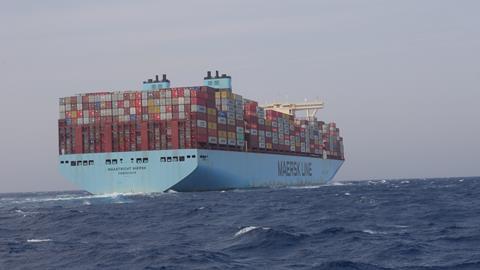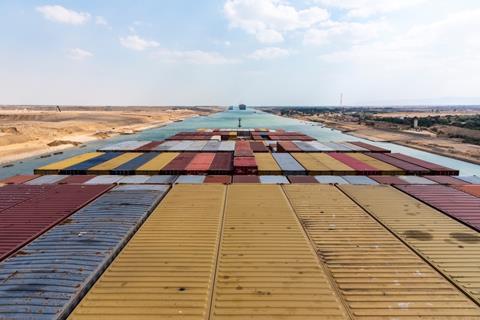With disruption to shipping being caused by Houthi rebels, industry leaders give their views on the ramifications for the supply chain

Cargo ships in the Red Sea are being targeted by rebel militia. �ڶ����� spoke to industry leaders to find out what the possible implications for the construction industry’s supply chain might be.
What’s going on in the Red Sea?
In the wake of Hamas’ October attacks on Israel, and the ongoing Israeli bombardment of Gaza, a Houthi rebel faction in Yemen has been attacking shipping in the southern Red Sea.
Cargo ships have been attacked by the Houthis since November. The group claims the ships being targeted are Israeli-affiliated but merchant vessels from other countries have also been fired on.
The Houthis are believed to be backed by Iran, and they are key allies of Hamas in Gaza.
Last week, the UK, the US and three other western allies carried out air strikes on 13 of Houthi targets in Yemen following weeks of warnings to the rebel group.
The Houthis have issued statements saying they are not deterred by the attacks, which they described as a “mistake” and “the greatest folly in their [the UK and the US] history”.
What’s happening to shipping?

The military activity in the Red Sea has deterred the majority of cargo operators from sending their ships through the quicker route to Europe that the Suez canal, at the top of the Red Sea, offers.
Nine out of 10 container ships are now being rerouted around the Cape of Good Hope at the southern tip of Africa, adding up to 20 days to journey times to the main European port at Rotterdam.
Prices for 40ft containers from the Far East to northern Europe have more than quadrupled in the past month, from around $1,170 at the beginning of December to more than $4,400 last week, according to freight booking portal Freightos.
How worried should we be?
Noble Francis, economics director at the Construction Products Association (CPA), advises caution but does not think the industry needs to panic just yet.
“It is certainly an issue to keep an eye on, especially given the number of large one-off disruptions that we have had in recent years; global pandemic, lockdowns, supply chain issues, war in Ukraine, energy and commodity price spikes,” he says.
“Firms need to have security and diversity of supply chain, not just source from the cheapest place. Plus, they need to be flexible to deal with the large one-offs that will be constantly, but unpredictably, coming.”
Iain Parker, head of London cost management at Turner & Townsend Alinea, says the shipping challenges in the region have not hit the industry so far. “We have not seen or heard of any real impact on construction,” he adds.
But he adds: “We know from experience that these situations are very delicate and a heightened or prolonged situation would not be welcome and runs the risk of becoming more of a business issue.”
‘Construction isn’t massively exposed’
Francis points out that three-quarters of products used in UK construction are made in the UK and so are largely unaffected, unless components in machinery used to make the products are affected.
He adds: “Of the 24% of construction products that are imported, two-thirds are from EU countries so are also largely unaffected. However, the country that the UK imports the most construction products from is China and imports from Asia will be affected.”
John Newcomb, chief executive of the British Merchants Federation, says: “At this time it is difficult to predict the impact on UK businesses. We have not seen a major impact on product prices here, though if the disruption continues this could change.”
Newcomb says the BMF and the CPA, which jointly chair the CLC’s Material Supply Chain Group, will “work with government and industry to monitor the developing situation”.

Steve Turner, executive director of the Home Builders Federation, says he has not currently been made aware of any impact on its members’ supply chains.
“The majority of materials for new homes are UK sourced, and those that are imported come mostly from Europe, and so the impact will likely not be as significant as when Russia invaded Ukraine or with covid.”
What products might be at risk?
Francis suggests that items such as electrics, white goods, lighting, kitchen and bathroom products, ironmongery and plywood may be affected by delays and price rises.
The delivery of solar voltaic panels from China may also be affected, according to Turner.
Simon Rawlinson, head of strategic research and insight at Arcadis, says there are likely to be solutions for the small number of products that might be delayed or less available.
“If we think about the kind of products that are routinely being shipped over, they’re fairly lightweight so it’s possible to get a lot of them into a container. We’re talking about small things like bathroom fittings,” he says.
“From a point of view of the actual cost of transporting an individual component part compared to some of the other inflationary pressures that we’ve seen in the past, it’s going to be manageable. That’s not to say it’s great, but it’s manageable.”
‘Things are not as bad as two years ago’
The main message from industry leaders is that the industry has had more difficult issues to deal with over recent years, such as when the container ship, Evergiven, blocked the Suez canal in March 2021.
“Two and a half years ago it was more the problem that ships couldn’t get into ports because there wasn’t enough room in the ports to get containers off ships,” Rawlinson says.
The situation is different to when the Evergiven blocked the Suez canal in 2021, which occurred at a time when there were already issues due to the supply chain problems after the lockdowns around the world
Noble Francis, economics director, CPA
“So there were multiple blockages in supply chains. What we’re seeing is a very predictable extension in the time that it takes to get certain products delivered, and where you can probably get an alternative anyway.”
Francis says some of the turmoil the industry has experienced in the past three years has actually made it fairly resilient.
>>See also: UK housebuilding recession: How much worse is it going to get?
“The situation is different to when the Evergiven blocked the Suez canal, which occurred at a time when there were already issues due to the supply chain problems after the lockdowns around the world,” Francis says.
“At that point, the cost of a 40ft shipping container from China to Northern Europe went from $1,500 in summer 2020 to $14,500 in October 2021, so the cost rises we see now are nowhere near that.”
‘If it goes on, costs may go up’
Alan Brookes, chief executive at Arcadis, says: “We’re not seeing an impact now but it depends on how long it goes on for. If it carries on and everyone keeps diverting [trade] you could see supplies getting held up.
“The real risk is inflation, just when it seems we’ve got control of it.”
He adds: “[Rising] inflation blows confidence. The world could do with some stability. We all live on confidence. When things are uncertain, people get uncertain.”
If it carries on and everyone keeps diverting [trade] you could see supplies getting held up. The real risk is inflation, just when it seems we’ve got control of it
Alan Brookes, chief executive officer, Arcadis
Francis says that at this stage the CPA has not seen major impacts on construction product prices, although it is still very early in the crisis.

“Clearly, if disruptions persist, it will significantly affect some imported products through the delayed supply and rises in freight prices,” he says.
He adds: “Current product supply is not an issue and UK construction products prices have been falling recently and, in November 2023, prices were 2.3% lower than a year ago.
“However, construction products prices are still 38.5% higher than in January 2020, pre-pandemic, which particularly hits firms on fixed-price contracts signed years in advance.”


























No comments yet